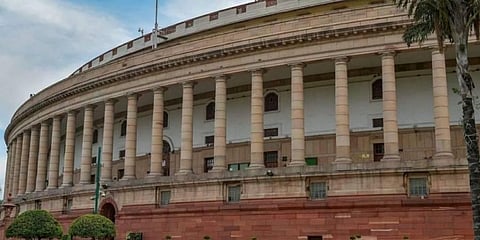

NEW DELHI: Parliament has been functioning without a deputy speaker, a post usually held by the main Opposition party, for nearly four years. The tenure of the current Lok Sabha is set to expire in just over a year. Constitutional experts and opposition parties have termed the ‘non-election for the post of deputy speaker’ as unprecedented and unconstitutional. The Constitution guarantees an important place for deputy speaker in the parliamentary system.
When the issue of the deputy speaker posts lying vacant in the Lok Sabha and several state assemblies came up before the Supreme Court last month, it had called the matter ‘very important’ and had sought a response from the Centre. Citing the vacant posts, the petitioner of the PIL pointed out that it was against the very functioning of a healthy democracy.
Speaking to TNIE, Constitutional expert P D T Achary said that the deputy speaker post holds significance, and by not holding an election for the past four years, the government is setting a bad precedent in the functioning of the House. “The current (17th) Lok Sabha was constituted in June 2019. Its tenure will be over next year. The post of deputy speaker is as important as that of the Speaker.
According to Article 93, as soon as the House meets after the election, the Speaker and the deputy speaker are elected one after the other. This is the first time that Lok Sabha is functioning without a deputy speaker for such a long time,” said Achary, who is a former secretary general of Lok Sabha.
Except for a few occasions, deputy speakers to the House were elected without much delay. “In the 10th Lok Sabha, S Mallikarjunaiah was elected as deputy speaker 33 days after the election of the Speaker. P M Sayeed was elected as deputy nine months after the election of the Speaker,” Achary said.
He pointed out that most governments have been following the tradition of choosing a member from the Opposition as a consensus candidate for the post of deputy speaker. In 1956, the first Prime Minister Jawaharlal Nehru proposed Sardar Hukam Singh, an Opposition Akali Dal MP, as Deputy Speaker, and most governments have continued this tradition.
According to the Rules of Procedure and Conduct of Business in LS, the deputy speaker enjoys the same powers as the Speaker when they preside over a sitting House, says Achary. According to Article 180 of the Constitution, the deputy speaker has the power to conduct the duties of the Speaker when the speaker’s chair is vacant.
Opposition parties too were up in arms over the issue. Though they have made several representations to Lok Sabha Speaker Om Birla, it didn’t find any resonance with the government, said Kodikunnil Suresh, Congress’ chief whip in Lok Sabha. “The convention is that the deputy speaker should be elected a week after the Lok Sabha is constituted.
This government is not ready to elect a deputy speaker even after we made several representations to the Speaker on this,” Suresh told TNIE. Congress Lok Sabha leader Adhir Ranjan Chowdhury has written several letters to the Speaker, and Parliamentary Affairs Minister, and has raised the matter in Business Advisory Committees too, Suresh added.
Congress general secretary Jairam Ramesh has also raised the issue recently. “For the last four years, there has been no deputy speaker in the Lok Sabha. This is unconstitutional. What a far cry from March 1956 when Nehru proposed the name of Sardar Hukam Singh, an Opposition Akali Dal MP & a critic of Nehru, for the post, and he was unanimously elected,” Ramesh said in a tweet. The second part of the Budget session of Parliament is scheduled for March 13- April 6.